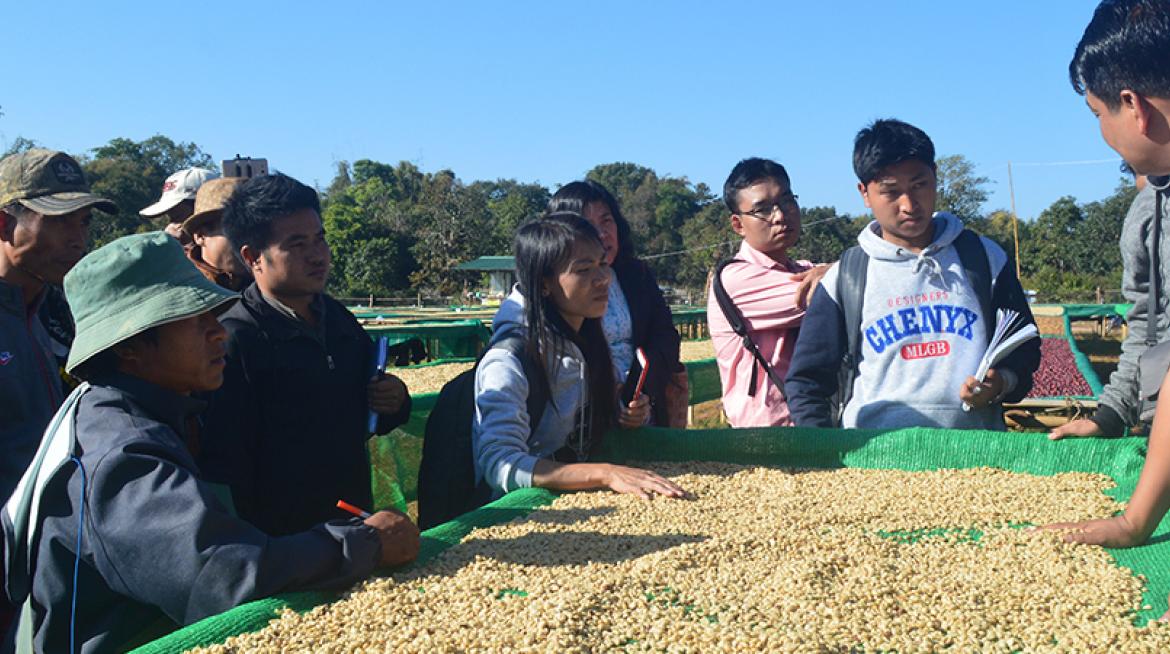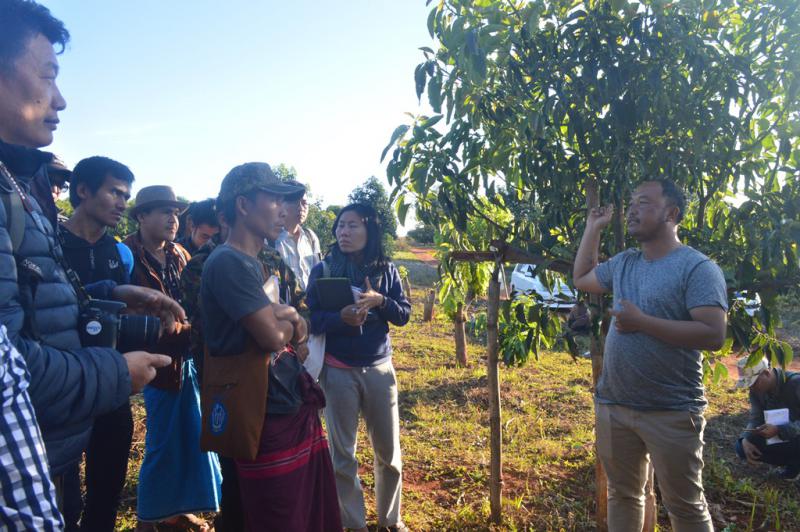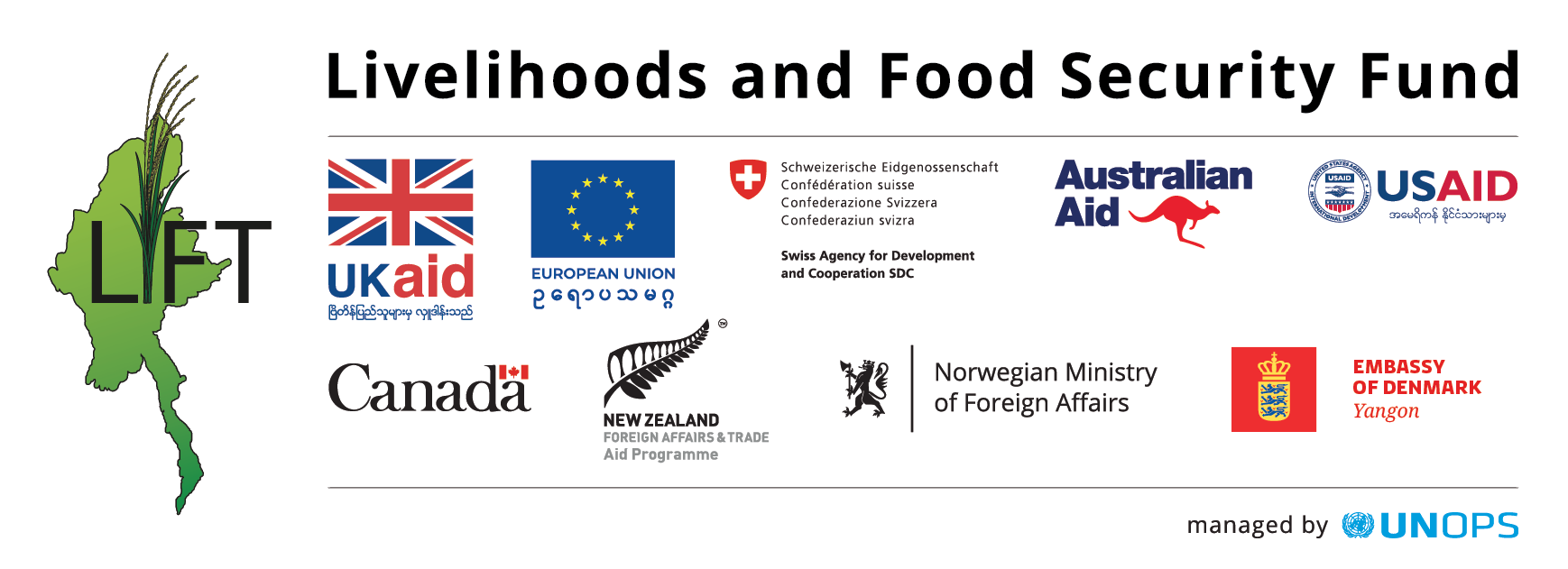
LIFT’s Uplands Programme held a three-day field study tour with the its small grants’ partners to learn more about agricultural value chain projects in southern Shan State in late January 2018. More than 20 people representing LIFT’s implementing partners who are active in agriculture in Chin, Kachin, Kayah, Kayin, Mon states and Tanintharyi Region joined the trip.
The study visit is part of LIFT’s communities of practice (CoP), the learning mechanism for LIFT and our implementing partners. LIFT’s programmes have identified a variety of CoPs around key thematic areas in line with the LIFT strategy (2014-2018) and LIFT’s commitment to learning and sharing knowledge. The Uplands Programme organised a first round of CoPs on nutrition, natural resources management, and value chains in April 2017. The idea for the Shan State study tour came from brainstorming discussions at the value chains CoP in 2017.
Why a study on agricultural value chains?
Myanmar relies on agriculture as the backbone of its economy and the sector brings around one-third of country’s gross domestic product (GDP) annually. According to FAO, the agriculture sector employs 70 per cent of the labour force in the country. Therefore, promoting agriculture value chains is an important part of the agenda in Myanmar’s agriculture development. Myanmar is located next to China, India, and Bangladesh – countries that have the fastest growing, and the largest, food markets in the world. According to some studies, the growth of the food market in these countries is 5-10 times faster than western countries. Myanmar has a geographic advantage for trade of agricultural products in the region. The development of highways, seaports and full access to the ASEAN free trade area provide more opportunities for Myanmar[1]. The regional trade alone requires rapid development of value chains. Developing efficient and effective agriculture value chains will boost the country’s economy and have positive impacts on farming community’s livelihoods.
Not easy, but a good start for the agri-value chain journey
Development assistance on agriculture has tended to focus on high yield production to help increase incomes for smallholder farmers. Focusing on value chain development is the next step. While the country is rapidly transforming with the special economic zones (SEZ) and regional trade, the linkage of agricultural products with markets becomes a pressing need.
The topic of agricultural value chains is still quite broad; approaches are varied between crops and a new subject for many agriculture projects. On the study tour participants could observe different crops’ value chain flows, structures and policy engagement processes. There are challenges as well as opportunities in value chain interventions for LIFT’s partners who are implementing projects in various parts of the country where geographical features vary. Throughout the trip, partners gained initial learnings on different value chain approaches for different crops. The lessons and best practices of the projects visited will help LIFT’s partners explore more about potential difficulties and opportunities in their areas. The field study tour inspired the group with best practices, lessons and core foundation of the process, including seamless extension services, innovative approaches, and market-driven interventions in the agriculture sector.
“All I thought about value chains was mainly about packaging or a change process of raw material to finished goods. I was not aware about adding-value along supply chains and how it could benefit farmers. I now know that there is a difference between value chains and value changed. Because of this trip, I understand that the value chain process starts at the beginning - for example ensuring the seed quality. I now see the value chain from a completely different angle,” said U Saw Eh Doh Htoo, the field supervisor for Karen Agriculture Department (KAD)[2] . LIFT’s partner the Border Consortium (TBC) is collaborating with KAD on relevant conflict-sensitive livelihoods projects.
In cooperation with WinRock and GIZ field teams in southern Shan State, the group visited projects that have high potential of achieving good impact – from the community level to policy. Of course, challenges remain; however, lessons learned move the projects forward step-by-step. The team observed the value chain journeys of southern Shan State’s major crops - green tea, coffee, potato, ginger, avocado, mango and soya bean. The projects visited are implemented by GIZ, USAID-backed WinRock and MFVP clustered associations. Some are run by local producer associations that receive technical training from development organisations and government institutions. With the demand-driven technical support, including extension services, the projects are improving the value chain process.
Leverage with opportunities and best practices
U Ding Rin Naw Ja from Metta Development Foundation (Kachin) said that many development projects focused on being inclusive of people at the grass roots level and a lot of the support was orientated to smallholders and poor people. He observed that the projects visited mainly took the facilitation role and let the local emerging leaders of medium and large scale famer groups lead the process. “I noted that the facilitation role and services for market linkages are very important in value chain promotion projects, addition to the funding support for the processing facility. We as Metta would apply this approach in our value chains project in Kachin and Northern Shan. However, we should not forget about the importance of stability in the project’s targeted area, which hugely contributes to the success of value chains projects. The projects in Southern Shan State have the advantages of stability. The support provided through the collective approach like farmer/producer associations and strong collaboration with the private sector is quite impressive and has wider impact for smallholder farmers as well,” U Ding Rin Naw Ja said.
During the visit, the team also met with strong, dedicated, and committed community leaders who are key actors in projects. They are passionate about their crops, curious about crop issues and market reach, eager to learn more to sort out the problems farmers face. They are also willing to take risks, such as loss on trials, and they try to find alternative approaches that can help them to mitigate the risks. They inspire people with their leadership skills and transparency and the collective approach through them is quite successful. “From our observation, the local farmers we met did a lot of research on their own as well as with the support of the projects. Innovative farmers then can lead to continue good practices even after the project phases out,” Daw Sandar Myo said. Sandar was the key facilitator of the visit. She is the Executive Secretary of the Myanmar Fruit, Flower and Vegetable Producer and Exporter Association (MFVP) as well as the chairperson of the Myanmar Avocado Association.
During the visit, the team observed:
- Coffee value chains implemented by WinRock in Ywangan Township - coffee plantation practices, post-harvest, processing, Q-cupper[3]/ certified coffee-tasting, private sector engagement, and marketing strategies
- Green tea value chains implemented by GIZ in Ywangan Township - the intervention strategies at plantations, processing, co-investment scheme, preparation for organic certification, and marketing
- Ginger value chains by WinRock in Heho Township - variety selection, sowing practices, preventive measures from soil-borne diseases, farmers field day, washing-station, and private sector engagement
- Potato value chains by CDN and potato cluster in Heho Township - policy intervention, variety selection, marketing
- Avocado by avocado cluster, MFVP in Hopong Township - advocating cultivation practices, processing facilities, market perspective and segment, and farmers group formation\
- Mango value chains by GIZ and Lawksawk mango cluster in Lawksawk Township - preparation for Global GAP certification, fertigation system, cultivation practices, farmers group formation and leadership role, and cost-benefit analysis
- Soya beans value chains by WinRock in Lawksawk Township - cultivation practices, collective marketing approach, and drying facilities
“I’ve learned a lot from this visit and I will explore more about how we can adapt the good practices that can be applied in our area. The important point I observed is the right choice of crop in the respective area,” said Dominic from the Karuna Mission Social Solidarity (KMSS) in Hakha, as he shared his experiences. He is very eager to develop elephant foot yam and avocado value chains; which have high potential for success in Chin State. The visit contributed to a key learning topics of LIFT’s, particularly in relation to private sector engagement. Engaging productive communities in the value chain approach and creating links to the private sector are priorities in LIFT programmes. More on LIFT’s work with the private sector can be read here.
LIFT would like to express our gratitude to WinRock, GIZ, and the Consortium of Dutch NGOs (CDN), MFVP clusters and SPSH company for facilitating, presenting and explaining about project activities ojn the study tour. Our gratitude goes particularly to Ms. Anne-Claire Degail, Mr. Timothy D. May, U Ko Ko Win, U Khun Tun Kyi, U Myo Myat Thu, U Thet Htun Aung, U Khun Tun Lin and Daw Nu from WinRock, Mr.Matthias Plewa, U Ye Lin Oo, Daw Hsu Pyae Kyaw from GIZ, U Aung Myat Kyaw from Heho, U Tun Myint and U Khun Tun Tun Win from avocado cluster, U Myint Oo, U Nyi Nyi Soe, U Kyaw Swar from Lawksawk mango cluster, U Sai Phyo Lwin Oo and U Hla Myint Kyaw.
Last but not least, thanks to Daw Sandar Myo, the trip’s facilitator, for her flexibility with tight working schedules and impressive facilitation.
[1] Abstract - a dialogue for enhancing the competitiveness of Agribusiness in Myanmar (2014) by Thomas Reardon, Professor (Agricultural, Food, and Resource Economics), Michigan State University
[2] KAD is the agriculture department of Karen National Union (KNU).
[3] A person who won the Q Coffee System’s acknowledged certificate. http://www.coffeeinstitute.org






